The 4 industries worst hit by tariffs so far
The Trump administration’s tariffs on U.S. imports are rippling through supply chains. However, some industries are disproportionately worse-off, depending on how exposed they are to imports. Here are the four sectors paying the highest price thus far.
Consumer goods companies have been worst affected.
A Reuters news agency tracker – which looks at how companies across the world are responding to Trump’s tariffs – found that importers of consumer goods were the worst hit industry during the first quarter of the year. It found that 42 companies reported price hikes, 39 withdrew or cut guidance and 18 took a financial hit. Of the U.S. companies tracked, Reuters found that food and drink conglomerate PepsiCo, and shoemakers Skechers and Crocs, were forced to make the most-tariff related actions.
Not only are consumer goods companies heavily reliant on imports, but they also run with leaner margins, meaning they’re more likely to pass on price hikes to consumers. Across the board, consumer prices are expected to rise by 1.8% in the short-run (defined as the next two years), according to an August analysis from The Budget Lab (TBL) at Yale University. This is the equivalent of an average per household income loss of $2,400. Apparel and footwear are set to see the steepest hikes compared to any other commodity, according to the TBL’s report. Short-term prices are expected to jump approximately 39% for leather products like shoes and handbags, 37% for apparel, and 21% for textiles more broadly.
Motor vehicle prices are expected to rise 12.4% in the short-run, the equivalent of an additional $6,000 to the price of an average 2024 new car, according to TBL.
Reuters’ tracker identified 18 companies in the “Automotive & Transportation” sector that withdrew or cut their guidance in the first quarter, and 14 that took a financial hit. The U.S. companies in this sector that took the most tariff-related actions (such as making supply chain changes or issuing profit margin warnings) were Tesla and General Motors.
The auto industry has been hit hard ever since President Donald Trump issued a 25% tariff on imports of vehicles and auto parts back in March (although some countries have also been able to strike deals to reduce those levies). However that’s only part of the story. The industry is also affected by a 50% tariff on steel and aluminum, which affects various auto parts, like exhaust systems, the electrical steel needed for electric vehicles, and components for buses. The Commerce Department also said on September 16 that it will consider requests from industry to impose additional tariffs on imported auto parts in the coming weeks based on “national security grounds.”



Leave a Comment
Your email address will not be published. Required fields are marked *